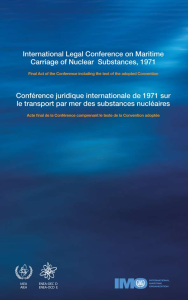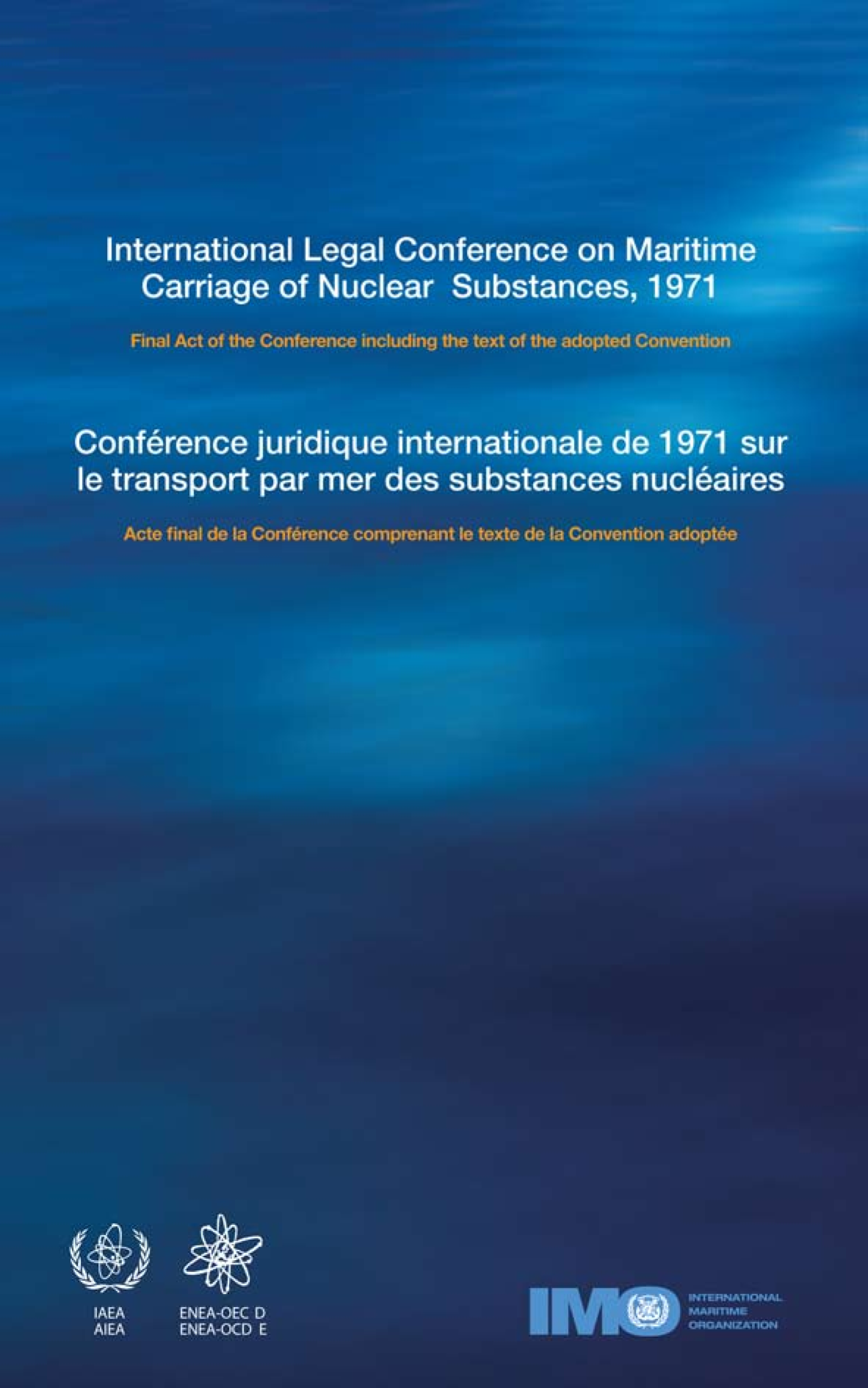The Intersection of Nuclear Energy and Maritime Transport
 In an era where nuclear energy plays a pivotal role in global power generation, the transportation of nuclear materials across international waters has become increasingly common. This practice, while essential, introduces complex legal challenges, particularly concerning liability in the event of a nuclear incident at sea. To address these challenges, the international community established the 1971 Convention Relating to Civil Liability in the Field of Maritime Carriage of Nuclear Material, commonly referred to as the Maritime Nuclear Convention. This treaty aims to delineate clear liability parameters, ensuring that victims of nuclear incidents during maritime transport receive appropriate compensation.
In an era where nuclear energy plays a pivotal role in global power generation, the transportation of nuclear materials across international waters has become increasingly common. This practice, while essential, introduces complex legal challenges, particularly concerning liability in the event of a nuclear incident at sea. To address these challenges, the international community established the 1971 Convention Relating to Civil Liability in the Field of Maritime Carriage of Nuclear Material, commonly referred to as the Maritime Nuclear Convention. This treaty aims to delineate clear liability parameters, ensuring that victims of nuclear incidents during maritime transport receive appropriate compensation.
Understanding the Maritime Nuclear Convention
The Maritime Nuclear Convention was adopted on 17 December 1971 in Brussels and entered into force on 15 July 1975. Its primary objective is to resolve conflicts arising from the simultaneous application of maritime conventions, which typically hold shipowners liable for damages, and nuclear liability conventions, which assign liability to nuclear installation operators.
-
Exclusive Liability of Nuclear Operators: The convention stipulates that if the operator of a nuclear installation is liable under either the Paris Convention or the Vienna Convention, or under national laws providing equivalent protection, then other parties, such as shipowners, are exonerated from liability for nuclear damage.
-
Scope of Exoneration: This exoneration applies to damage caused by a nuclear incident during maritime transport, including damage to the nuclear installation itself, property on its site, and the means of transport carrying the nuclear material.Intentional Acts: The convention does not exonerate individuals who cause damage intentionally.
-
Supersession Clause: In cases of conflict, the Maritime Nuclear Convention supersedes other international maritime conventions to the extent of the conflict
Historical Context: The Need for a Specialized Convention
Prior to the convention, the transportation of nuclear materials by sea was governed by a patchwork of maritime and nuclear liability laws. This often led to legal uncertainties, especially when determining the liable party in the event of a nuclear incident during maritime transport. The need for a unified legal framework became evident as the use of nuclear energy expanded and the volume of nuclear material transported by sea increased.
Practical Applications and Industry Implications
For Maritime Operators:
-
Liability Clarity: Shipowners and carriers are provided with legal certainty, knowing they are exonerated from liability for nuclear incidents, provided the nuclear operator is liable under the relevant conventions or equivalent national laws.
-
Insurance Considerations: The convention reduces the insurance burden on maritime operators, as they are not required to cover liabilities arising from nuclear incidents during transport.
For Nuclear Operators:
-
Exclusive Responsibility: Operators must ensure they have adequate financial security to cover potential liabilities, as they bear exclusive responsibility for nuclear incidents during maritime transport.
-
Compliance Requirements: Operators must comply with the provisions of the Paris or Vienna Conventions or equivalent national laws to benefit from the exoneration clauses.
Case Studies: Real-World Applications
Transport of Nuclear Fuel:
A nuclear power plant in Country A exports spent nuclear fuel to Country B for reprocessing. During maritime transport, an incident occurs, leading to the release of radioactive material. Under the Maritime Nuclear Convention, the operator of the nuclear installation in Country A is exclusively liable for the damage, exonerating the shipowner from liability.
Import of Radioactive Isotopes:
A hospital in Country C imports radioactive isotopes for medical purposes. The isotopes are transported by sea from Country D. If a nuclear incident occurs during transport, and the operator in Country D is liable under the Vienna Convention, the shipowner is exonerated from liability under the Maritime Nuclear Convention.
Challenges and Future Considerations
Limited Ratification:
As of recent data, the convention has a limited number of contracting parties. This limited adoption may lead to inconsistencies in liability determinations across different jurisdictions.
Evolving Maritime and Nuclear Technologies:
Advancements in nuclear technology and maritime transport may introduce new risks not fully addressed by the convention. Continuous evaluation and potential amendments may be necessary to keep the convention relevant.
Integration with Other Legal Frameworks:
Ensuring seamless integration between the Maritime Nuclear Convention and other international treaties, such as the International Convention on Civil Liability for Oil Pollution Damage, is essential to avoid legal overlaps and conflicts.
Conclusion: The Significance of the Maritime Nuclear Convention
The 1971 Maritime Nuclear Convention plays a crucial role in clarifying liability for nuclear incidents during maritime transport. By assigning exclusive liability to nuclear installation operators and exonerating maritime carriers, it provides legal certainty and ensures victims receive appropriate compensation. As the global reliance on nuclear energy and maritime transport continues to grow, the principles enshrined in this convention remain vital for maintaining a balanced and fair legal framework.
FAQs
Q1: What is the primary purpose of the Maritime Nuclear Convention?
A1: To assign exclusive liability to nuclear installation operators for nuclear incidents during maritime transport, thereby exonerating other parties like shipowners from liability.
Q2: Does the convention apply to all countries?
A2: No, it applies only to countries that have ratified the convention. However, its principles influence international maritime and nuclear liability practices.
Q3: How does the convention interact with the Paris and Vienna Conventions?
A3: It complements these conventions by ensuring that if a nuclear operator is liable under them, other parties involved in maritime transport are exonerated from liability.

